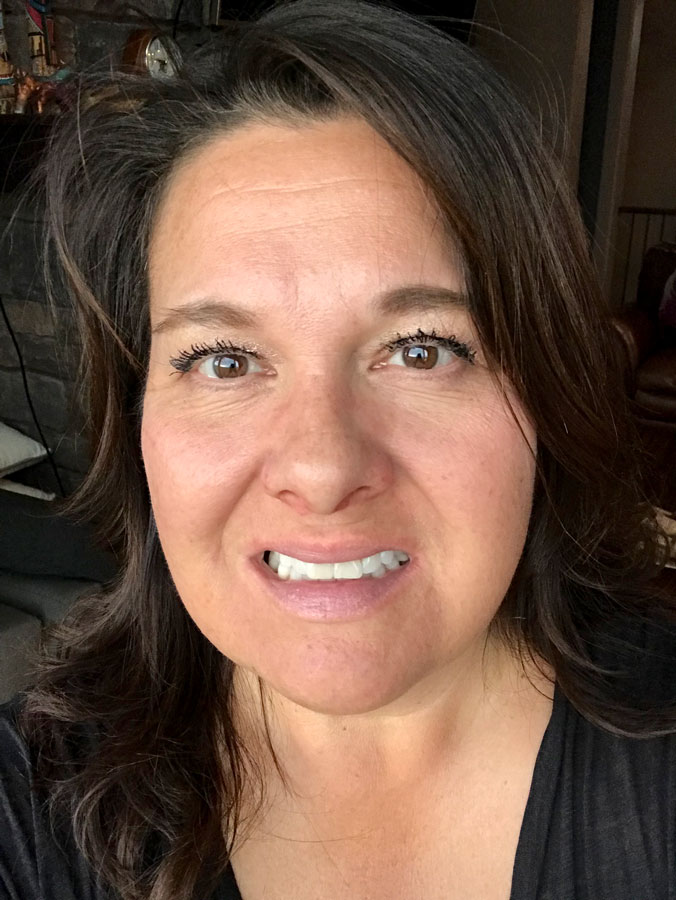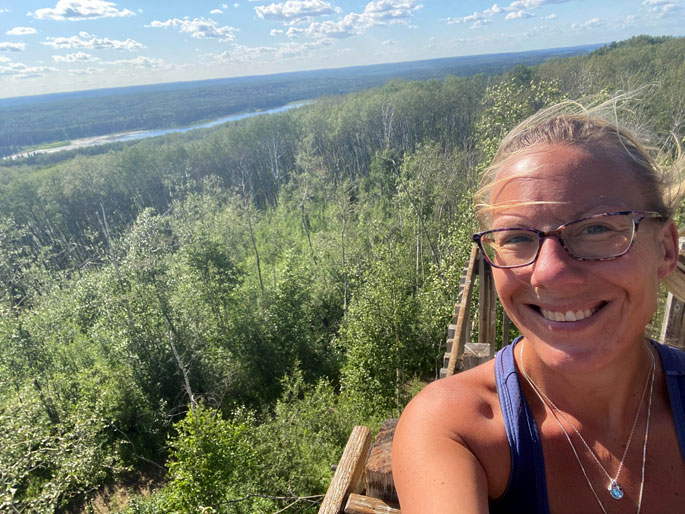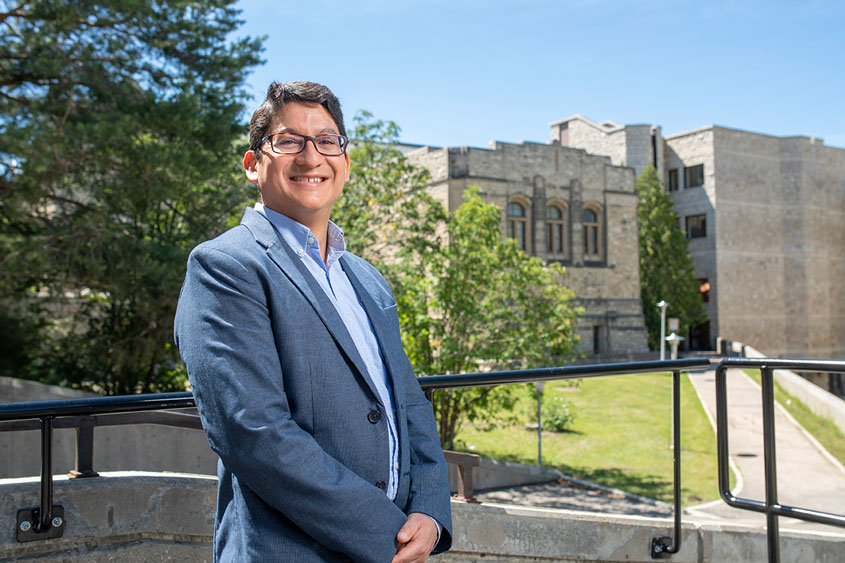Giving power to the people
Community-led change at the heart of new USask energy security program
By MATT OLSON (BMUHON'15)Melissa Beatty is putting her SENS education to use for the Peter Ballantyne First Nation at her home community of Deschambault Lake and striving towards energy self-sufficiency. Photography: Liam Richards (BA’12)
Born and raised in Alberta, Rory Wheat (BSc’20) grew up in what he called the heart of Canada’s oil and gas industry.

It’s that front-row seat to the energy industry that led Wheat to believe the Prairie provinces could be leaders of new energy transitions — and that led him to the new Energy Security program at the University of Saskatchewan (USask).
“For the University of Saskatchewan, in the heart of the Prairie provinces, to have a program focused on how to sustainably transition your energy sector while maintaining energy security in Canada’s North — I think that’s really cool,” said Wheat, one of the first group of students to graduate from the program, who now lives in Edmonton.
The Master of Sustainability with a focus in Energy Security is a new degree stream from USask’s School of Environment and Sustainability (SENS). Wheat is part of the first graduating class, having graduated in June of 2022.
The new master’s program is focused on developing professionals to work with Indigenous, Northern, and remote commun-ities to lead and create renewable energy development projects.
Wheat said the use of oil and gas is “fundamental” to the well-being and livelihood of so many Canadian citizens. He also noted he’s excited by the opportunity to step into an ever-important industry in Canada and around the world.
“I saw this a way I could take my prairie roots and try to apply them to bringing more awareness and learning more to a new energy transition, and how Western Canada ... could be a part of that,” he said.
Putting tools in the toolbox for remote and Indigenous communities
The new program includes a curriculum advisory committee comprised of faculty, industry professionals and community leaders.
Melissa Beatty (MNG’13), band manager for Peter Ballantyne Cree Nation (PBCN) in her home community of Deschambault Lake, is on that committee.

Beatty is also a graduate of the program.
She said the program, with Indigenous community leaders involved as advisers, has been a place for all voices to be heard.
“Environment and sustainability has always been in our culture. This program allows for that space for our stories to be told — that’s one key thing I love about it,” she said. “It’s a bridge ... I’m learning from the Western side, and then there’s our side and what we bring.”
Beatty’s first language is Cree — the same as many others in her community — and she said it makes a tremendous difference to meet people in the community on their terms when it comes to communicating new projects.
While the program is still in its early stages, Beatty has been excited by what she’s seen so far both as an adviser and as a student.
But right now, this USask program can be the foundation for communities to tackle energy issues in a way that fits with the wills of community members.

Heather Bishop, the director of economic development for Cold Lake First Nation in Alberta, is also part of that committee. She called the new program critical for connecting students to the professional world.
“It presents an opportunity where you can blend real-world experience and experiential learning with the academic side of things,” she said.
Bishop noted there are so many different “sub-areas” of sustainability and energy security that need to be considered when stepping into the sector.
She hopes the program can provide a way forward for prospective professionals in the field — particularly Indigenous students who will return to their home communities.
“Ultimately, what I hope to see out of the program is a roadmap for the students to say ‘here’s all the different facets of this industry, and here’s some of the barriers and challenges you might face’ ... A set of resources and key concepts that students will be able to apply for themselves at the end of the program, and execute,” Bishop said.
The pains of keeping the lights on
Some of the first graduates of the new program were already working in the field of energy security and looking to add to their toolboxes.
Nadine Goldstone (MsS'22), inaugural graduate of the Master of Sustainability - Energy Security program, works for SaskPower. She referred to issues of energy security as an “affordability crisis” in northern Saskatchewan.

Many Northern Saskatchewan communities don’t have easy access to natural gas for heat, Goldstone said. She says heating a home with electricity typically costs more than with natural gas.
“Add in the compounding factors of overrepresentation in poverty, maintenance cycles that aren’t great ... you’ve got a lot of challenges,” she said.
Goldstone had previously piloted a program for SaskPower addressing energy poverty challenges in Northern communities.
The program is aimed at addressing some of the root issues around energy security, including more academic instruction like energy literacy and emphasising behavioural adjustments as well as infrastructural planning and community capacity-building between local people and energy providers.
An important piece to this program is participating students don’t have to travel to Saskatoon to complete their studies as they are concluded online remotely and at times that are accessible for the student.
Many students are already holding down regular day jobs in their communities and need to find time to handle the academic workload. This program allows students to fit their studies into their lives thanks to the online delivery.
Goldstone, like Bishop, emphasised that energy security is a broad subject. While the issues of today might focus on affordability, tomorrow the term might be more targeted towards transitioning to new energy sources.
While the program’s focus on Northern and Indigenous communities will help provide training and skills that individuals will take back to their communities, Goldstone said another benefit is its cross-Saskatchewan relevance and international appeal.
“It teaches the interconnectedness — whatever lever you pull has an impact 18 levers down the way,” Goldstone said. “It brings in concepts of resilience and social aspects to traditionally environmental sustainability concepts, which is important because ... you’re not going to get energy security if you don’t have strong social or governance components in your strategies.”
Community leaders for community energy transitions
Dr. Oscar Zapata (PhD), one of the course instructors for the Master of Sustainability - Energy Security program, came to USask to be involved with this program.
He said he was “very excited” to see the promotion of community-focused energy transitions and similar projects.

“The program was designed to promote these energy transitions in remote communities, Indigenous communities, and we’re committed to that,” he said. “We want to take this opportunity to improve peoples’ lives.”
Zapata stressed that the work of the new program had to be a collaborative effort between students, faculty, industry professionals and community leaders to succeed — or as he put it, energy projects that must “align with a community’s world view.”
“I would like to see a growing number of graduates that can work together with one another. This is a collective effort ... what is happening in one community can inform what is being designed or planned in another community,” Zapata said.
The executive director of SENS, Dr. Karsten Liber (PhD), says there is not another program such as this anywhere in Canada and it provides students with a life-changing opportunity for them and their home communities.
“That’s the whole point of this, to not only provide education, but to open up opportunities for people in the North who don’t have the opportunity to participate in university in general.”
Beatty is a firm believer in the program’s future.
“I’m glad that this program exists. It’s something I needed, and it’s something that’s very valuable. It falls in line with my values as a First Nations person,” she said. “I feel at peace with it.”


